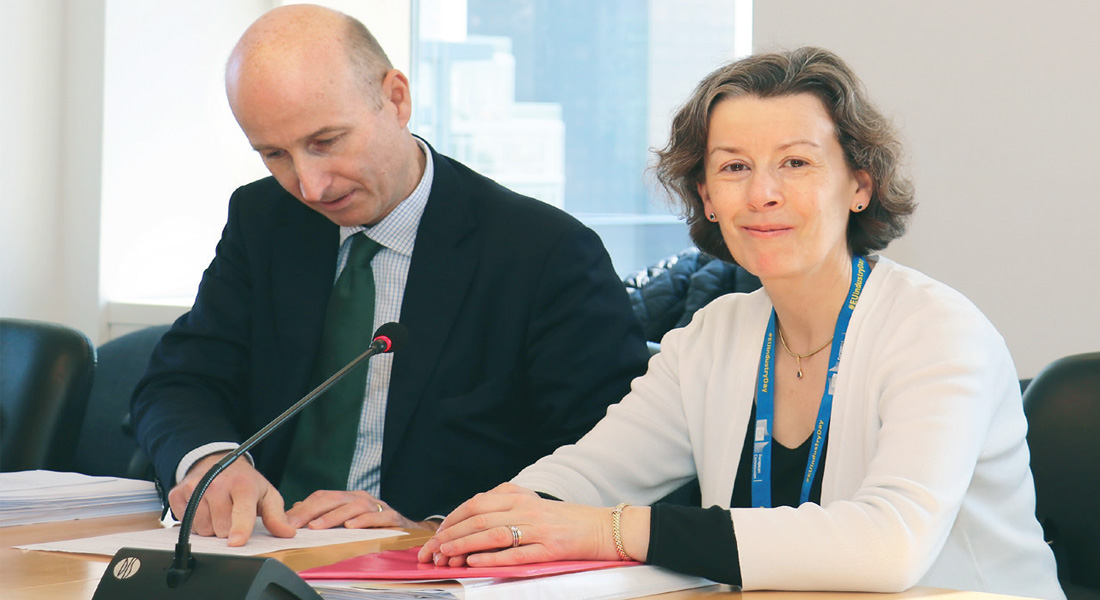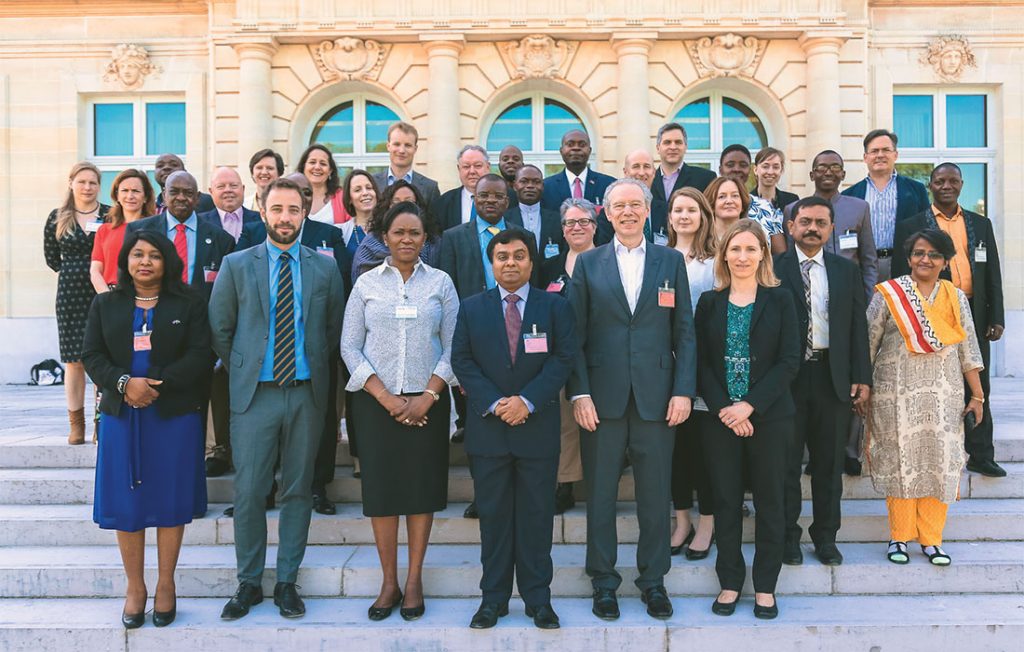The European Union, as the chair of the Kimberley Process (KP) for 2018, hosted this year’s Intersessional meeting in Antwerp, Belgium from June 18th-22nd. This year’s Intersessional meeting – the annual forum where members gather to discuss the technical aspects of the various working groups that comprise the KP – reviewed the latest developments in the implementation of the Kimberley Process Certification Scheme (KPCS) and wider diamond governance, as well as the ongoing reform agenda of the KP. The Intersessional was attended by the global diamond community consisting of diamond-producing and trading countries, the diamond industry and civil society.
The World Diamond Council (WDC) reaffirmed its commitment to driving ongoing positive change through reform at the Intersessional meeting. Individual members of the WDC currently serve on a range of KP working groups that include Monitoring, Central African Republic (CAR) Monitoring Team, Statistics, Rules and Procedures, Participation and Chairmanship, Alluvial and Artisanal Production and Diamond Experts.
Kimberley Process chair Hilde Hardeman, in her closing speech, said, “I would like to thank all concerned for the fruitful work this week on helping the Central African Republic to address the challenges it is facing. This goes to the heart of what the Kimberley Process is about. We must make sure that we deliver. The reform and review agenda has taken a central place in our work this week, and will remain central for the months ahead. Reform must help ensure that the Kimberley Process remains fit for purpose in a changing world.
“We further need to continue our work on developing a clear and convincing approach to responsible sourcing, as part of the review of the core document, which will cover the issue of the scope. The position of mining communities is central in this regard.
“There are many opinions on how we should shape a future permanent secretariat, to take up and further develop the role that is currently played by the Administrative Support Mechanism. That is why the European Union has made it possible to conduct an independent needs assessment on a dedicated secretariat and a multi-donor fund. We need pragmatic solutions that respond to the real needs, that work and are sustainable, also financially.”
Hardeman said the KP was paying attention to alluvial and artisanal mining, and that further research could help in improving traceability, and contribute to giving consumers the necessary guarantees. Both aspects will remain a focus in the time ahead, she added.
In a speech, Stephane Fischler, acting president of the WDC, reiterated the need for KP review and reform in the areas of scope of conflict diamonds, KPCS minimum standards, and longterm implementation of KPCS directives via a permanent secretariat. He also appealed to alluvial diamond producing countries, in particular, to embrace the opportunities for progress and improving lives in their own communities made possible with the KP.
In addition to encouraging KP reform, the WDC continues to advocate for positive change from within. In June, the WDC System of Warranties (SoW) entered a public review period following the completion of an industry review. The WDC SoW extends the assurances provided by the KPCS by requiring all diamond suppliers and diamond jewellery manufacturers to pass on a conflict-free warranty statement each time diamond goods (rough or polished) change hands. It also asks SoW statement users to ensure that trading activities maintain strict adherence of universally accepted principles on human and labour rights, anticorruption and anti-money aundering in support of the obligatory implementation.
The WDC is also taking an active role throughout the year in encouraging reform by meeting directly with organisations and governments that can effect change in areas where the issues of conflict diamonds are most acute. In May 2018, executives from the WDC travelled to the Democratic Republic of Congo (DRC) and met with the chair of the Working Group on Artisanal and Alluvial Production (WGAAP); the minister of mines; the Center for Evaluation, Expertise and Certification (CEEC) chair, deputy chair and team; the Diamond Development Initiative (DDI); and DRC civil society members. In April 2018, the WDC pledged its support to the Organisation for Economic Co-operation and Development (OECD) due diligence guidance for responsible supply chains of minerals from conflict-affected and highrisk areas.
“Together through the KP, civil society, government and industry are making important progress toward long-term solutions that address the modern challenges of diamond communities around the world,” said Fischler. “But that is not enough. We must also look within ourselves to encourage dialogue, listen to concerns and drive meaningful and ongoing progress from within. By constructively challenging policies and procedures, together we will create a better path forward and uphold the duty of care we owe to the people and communities where diamonds are produced.”
In his closing remarks, Sipho Manese, chair of the Working Group on Monitoring, informed that the CAR Monitoring Team was able to shorten and streamline processes of monitoring shipments in the CAR to seven days, from the initial two weeks. The US reiterated its strong concern for the situation in the CAR, where there are five Western zones from which rough diamonds can be exported lawfully consistent with the KP. “Hundreds of thousands of rough diamonds from across the country are still exiting illegally, which underscores the important work of the KP CAR Monitoring Team to assist the CAR government with monitoring its rough diamond exports,” the US Mission to the EU stated.
In a separate statement, the Antwerp World Diamond Centre (AWDC) said that 2018 was an important year for the KP, which is at a crucial stage of its development. Under the leadership of the European Union, the KP is discussing an ambitious reform agenda with three priorities: a deepening of the KP, including the reinforcement of the system of controls and the transformation of KP recommendations into minimum requirements; an expansion of the KP by means of broadening the definition of conflict diamonds; and the professionalisation of the KP by, among others, the establishment of a permanent secretariat.
We must also look within ourselves to encourage dialogue, listen to concerns and drive ongoing progress from within. By constructively challenging policies and procedures, together we will create a better path forward and uphold the duty of care we owe to the people and communities where diamonds are produced.”
Today’s consumers place great importance on the socio-economic value of diamonds. It is therefore very important that the KP broadens its mandate.”
During the KP Intersessional, participants and observers engaged in a thorough discussion of the reform agenda in order to lay the foundation for decisions that will be taken during the KP Plenary meeting at the end of the year. Taking place in Brussels this coming November, it is hoped that it will be the start of the KP 2.0.
The KP was established in 2003 with the objective to eliminate conflict diamonds from the diamond trade. Since its establishment, the percentage of conflict diamonds has declined to 0.2% from an estimated 10%.
The AWDC added that the KP needs to adapt to changing consumer demands. “Today’s consumers place great importance on the socio-economic value of diamonds. It is therefore very important that the KP broadens its mandate. During this KP Intersessional, civil society as well as the global diamond industry – serving as observers inside the KP – declared themselves ready for the broadening of the definition of conflict diamonds.
“Furthermore, the global diamond industry – in support of the KP – developed its own standards years ago to ensure that diamonds are mined and traded in an ethical and transparent manner. The Responsible Jewellery Council (RJC), the Diamond Development Initiative and the WDC’s updated System of Warranties are clear examples of this effort.
“The industry in this regard affirms the ambitious perspective of the European Union. Therefore, both hope that the more conservative members of the KP will arrive at new insights during this Intersessional meeting, so that the KP may continue to reinvent itself and evolve in such a way as to keep up with the times.”
The discussions that took place at the Intersessional will be continued during the Plenary meeting in Brussels from November 12th-16th, 2018.



